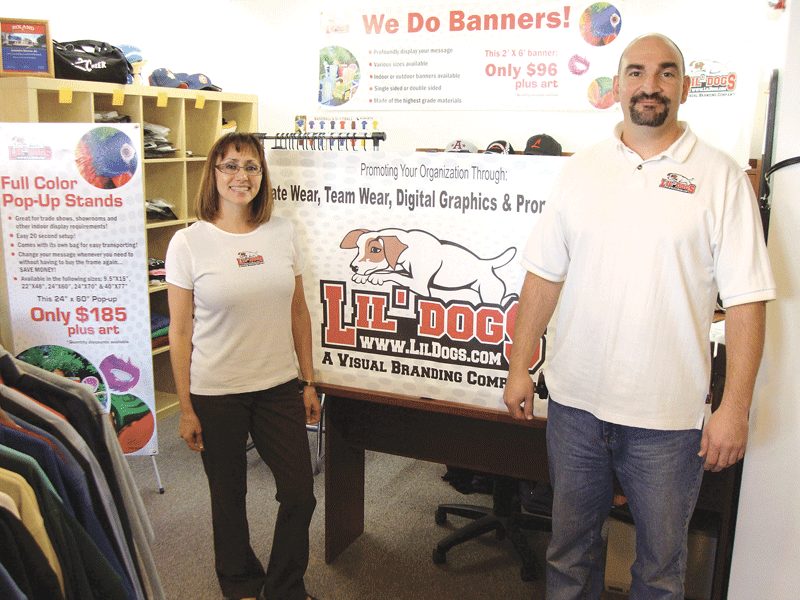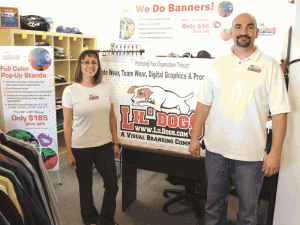
Company to Watch: Lil’ Dogs
This Growing Company Puts Its Brand on Business
The term ‘visual branding’ translates roughly to depicting a specific design or logo — corporate, academic, political, personal — on everyday objects. For Andy and Pam Boryea, owners of Lil’ Dogs, the possibilities for what medium that takes knows few bounds.Clothing, banners, those perforated vehicle wraps that one sees commonly on buses, the ubiquitous political lawn placards, as well as the smaller office objects like pens, travel mugs, and many, many other promotional items, all have passed through the shipping dock of the Ludlow-based company.
“It’s a one-stop shop,” Andy said. But the origins of the company were a bit more specific.
Back in 1997, three friends, all professional soccer players, decided to start a youth soccer camp. Stu MacRury and Glen Jusczyk asked Andy Boryea onboard to provide the goalie for the camp.
When Boryea bought into the business, he found that his partners had purchased some used screen-printing equipment. “They thought they were paying too much for the 60 camp T-shirts they ordered,” he told BusinessWest.
At the time, he knew nothing about that process, but as word-of-mouth spread locally that the trio could make T-shirts, the orders started coming in. “Friends and friends of friends would ask us to do shirts for construction companies, landscapers, you name it,” Boryea said. “My father was one of my first customers.”
Deciding to learn more about the process, he jumped in headfirst and went to school for advanced training. And that, he explained, is how the business got its start.
MacRury sold his share of the company, and Jusczyk and Boryea decided that the screen-printing facet needed its own name. Jusczyk had recently bought his girlfriend a Jack Russell terrier puppy, and after determining that a toll-free number could be acquired to correspond to the words ‘lil’ dogs,’ their own brand became visualized.
“After a while it was just Glen and myself, doing both camps and printing,” Andy continued. “So here we were, working a ‘real job’ during the day, landscaping or whatever soccer players do to make a living — roofing, siding, landscaping, you name it — then we would do the soccer practices after that, and then late at night, we’d be printing T-shirts.”
Around 2000, the state regulated athletic camps more stringently, requiring medical doctors to sign off on their health plans. Boryea said the cost to do so was prohibitive, and in 2001, they sold the soccer camp and became a full-time print shop. Pam joined the team in 2007, and a year later, husband and wife bought the company outright.
What started out as approximately $15,000 in sales in 1998 has grown exponentially each year.
Pam said that the year she joined the company, Lil’ Dogs was posting $2.5 million in total sales. There were some acquisitions along the way, she said, citing the purchase that year of Advantage Athletics in Palmer. But the pair credits a good part of the growth to both word-of-mouth and the aggressive sales techniques of their former partner.
“We were doing no advertising,” Andy said. “But the miles that Glen would rack up … 100,000 a year, easily. He was all over, pushing the company. He’d go play a match and come back with orders from the other team.”
But as sole owners, the Boryeas said that one doesn’t become a multi-million dollar company as a local screenprinter, so they made the shift toward corporate and academic clients, often doing subcontracted work for some of the most recognizable athletic brands.
But the individual customer is just as important, Andy emphasized. “We’re a one-stop shop for all visual branding because I don’t want my clients to need to go to someone else for different products. Because if I don’t have the ability to do it all, someone else will.”
And to keep that one stop always on the cusp of unfolding technology, Andy belongs to trade organizations and consults within the industry. “I’ve seen a lot, I know a lot, and we can offer more than our competition before they even hear about unfolding innovations,” he said, noting that a recent acquisition represents the latest word in specialized printing: wide-format digital. “Take your home printer and multiply its dimensions by 20. That printer can work on a multitude of rolled materials.”
Pushing their industry further, Pam said that she’s at work launching a Web-based self-created clothing program for customers, offering the ability to design online one T-shirt or many. But still, the pair said that their attention will always be on the customer’s immediate needs.
Andy related the story of how Nike contracted Lil’ Dogs to manufacture some transfer designs for the New York Yankees this past season, to be sold and custom processed at their home in the Bronx.
“They told me on a Monday night that they ‘might’ want me to print some transfers for sale at the stadium,” he said, pausing a beat for effect before adding, “for Wednesday morning.”
“So, I said, ‘OK … well, you have to let me know if you do want them,’” he continued. “They said, ‘we’ll let you know.’ I had to report back to the stadium on Tuesday, and at that time they said, ‘OK, but we don’t have any art for you.’
“So it’s Tuesday at 3:30, and I finally got the art,” he continued. “Given the technology we use, I was able to log into the office from my hotel room in New York and send it to Ludlow. By 5 that night we printed them all out, and they were in a box by the time I showed up for duty the next day.”
Of course, if the Yankees’ postseason was as successful as the work done by Lil’ Dogs, Red Sox fans would be a little less cheerful these days.
— Dan Chase






